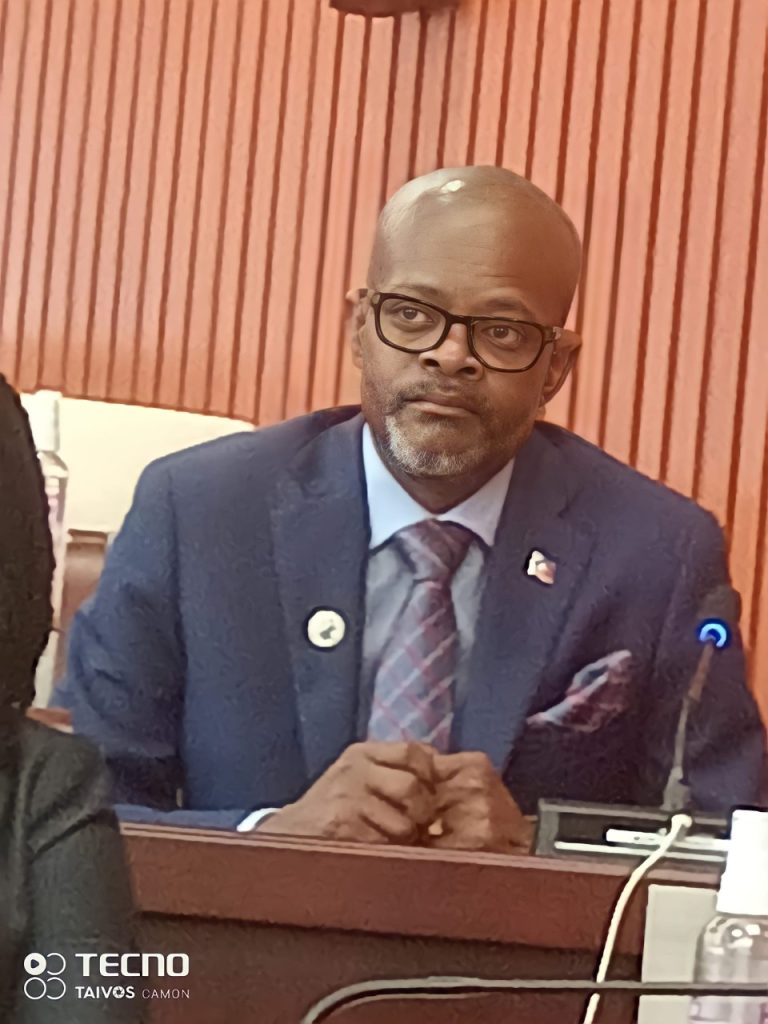Montserrado County Senator, Abraham Darius Dillon, has expressed his strong dissatisfaction with President Joseph N. Boakai and the Unity Party government’s performance, declaring an end to the “honeymoon period” and demanding improved governance in 2025. Senator Dillon, also Chair of the Senate Committee on Foreign Affairs, conveyed his disappointment during a press conference held at the Liberian Senate on January 13, 2025, following the commencement of the Senate’s second session. He criticized the government’s overall performance in 2024, characterizing it as “not too pleased,” though acknowledging some progress made by the Senate in areas such as website development, employee benefits, and initiating financial audits. He assigned the Senate a grade of 80% from a reform perspective, while implying a considerably lower assessment of the executive branch.
Senator Dillon emphasized the Senate’s commitment to holding both the Executive and Judiciary branches accountable in the new year. He highlighted the importance of maintaining quorum and pledged to inform the public, through the media, about senators’ attendance records. He underscored the transition from a period of leniency to one of stringent oversight, stressing that the time for settling in and making appointments has passed, and the focus must now shift to effective governance and delivering results for the Liberian people. The senator indicated that the Senate had provided the necessary support to President Boakai during his first year, allowing him to assemble his team and establish his administration. Now, he asserts, it’s time for the government to demonstrate its competence and address the pressing issues facing the nation.
Senator Dillon clarified the rationale behind the “honeymoon period,” explaining that it’s a customary practice, even in the United States, to allow a new administration time to settle in and appoint its preferred personnel. This grace period, he argued, prevents hindering the government’s initial operations and provides the executive branch with an opportunity to establish its footing. He cited the security challenges faced in early 2024, including protests by wives of Armed Forces of Liberia personnel and the absence of confirmed Defense and Justice Ministers, as examples of the vulnerabilities that can arise during a transitional phase. By providing leeway during this initial period, the Senate aimed to ensure stability and avoid exacerbating potential crises.
The senator stressed that this period of leniency has concluded and the government is now expected to function fully and effectively. He signaled a more assertive approach from the Senate, particularly regarding adherence to the Tenure Law of Liberia. Senator Dillon made it clear that the practice of officials holding acting positions for extended periods, especially in critical roles like the Governor of the Central Bank, would no longer be tolerated. He emphasized the importance of adhering to legal procedures and ensuring that qualified individuals are appointed to these pivotal positions. This, he argued, is essential for maintaining stability and promoting confidence in the country’s financial institutions.
Furthermore, Dillon emphasized the urgency of addressing the needs of the Liberian people and lamented the lack of tangible progress thus far. He expressed his commitment to ensuring that the “rescue” of the nation, a term often used in reference to the change in administration, translates into meaningful improvements in the lives of citizens. He believes that the Senate’s role is not merely to oversee the government but also to drive progress and ensure accountability. This, he stated, requires a proactive approach and a willingness to challenge the executive branch when necessary. He called upon his fellow senators to join him in this effort and to prioritize the interests of the Liberian people.
Finally, Senator Dillon’s pronouncements signal a more assertive posture from the Senate, a shift from accommodation to active oversight. He made it clear that the Senate will no longer tolerate delays in appointments, violations of tenure laws, or a lack of concrete progress in addressing the nation’s challenges. He emphasized the Senate’s role in holding the executive branch accountable and ensuring that the government functions effectively and transparently. This tougher stance suggests a potentially more contentious relationship between the legislative and executive branches in the coming year, as the Senate moves from a supportive role to one of critical scrutiny. This development underscores the evolving political landscape in Liberia and the increasing demands for accountability and good governance from elected officials.


